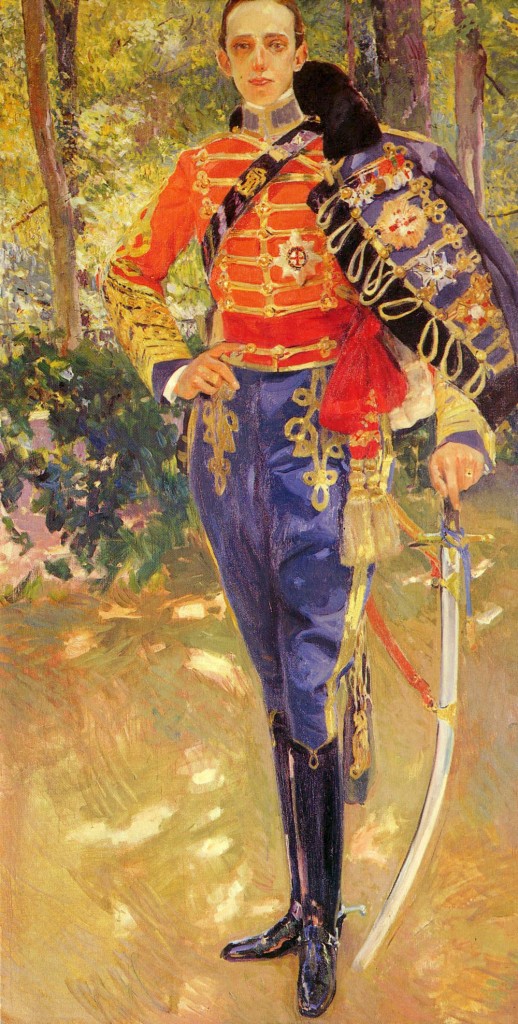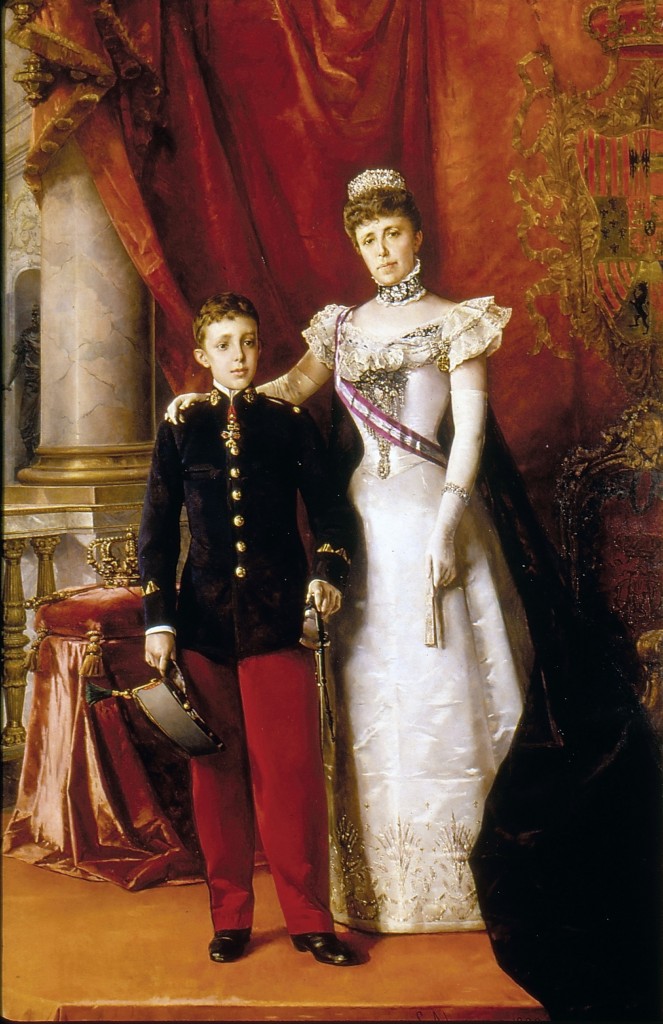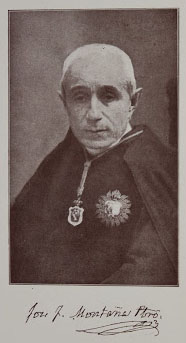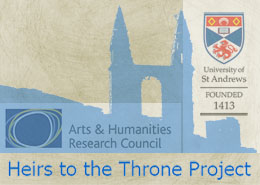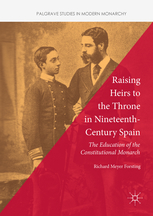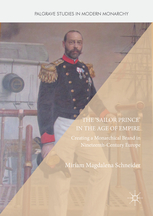‘The altar boy king?’ 
Richard Meyer Forsting
On 21 December 1900 an article in the conservative Catholic daily El Siglo Futuro condemned the liberal politics of the government as irreconcilable with Christian values and the divine right of kings. The author went as far as stating that ‘liberalismo es pecado’ (liberalism is sin). Apart from its rather aggressive tone, the article did not seem extraordinary by the standards of the paper. However, the author was no ordinary priest, theologian or conservative politician – the usual contributors to El Siglo Futuro – but Padre Montaña, confessor to the queen regent Maria Christina of Habsburg and, more significantly still, the religious teacher of the Spanish king, Alfonso XIII. The proximity of a reactionary, ultra-Catholic priest to the young monarch, who was to take over the reins in less than two years, seemed to confirm fears that he was not educated according to liberal principles. The republican press in particular, interpreted the affair as evidence of the monarchy’s anti-constitutional intentions and Alfonso XIII’s education came under increasing scrutiny. Doubts and fears manifested themselves in many of these comments: Could a constitutional monarch be raised in such a reactionary environment? How was someone like Montaña allowed to teach the future ruler of Spain? What did this mean for Alfonso’s impending reign? What kind of king would Alfonso XIII be?
This was by no means the first time that some of these questions were being asked. The influence of the clergy in the education of Spanish monarchs-in-waiting and its potential consequences had already been an important topic in the upbringing of Alfonso XIII’s father, Alfonso XII. In 1862 a decree, which prioritised the heir to the throne’s military and religious education had come under intense criticism from progressive liberals, who saw it as symptomatic of the church’s excessive influence in Spanish society. At the time, the left liberal La Iberia asked rhetorically if the stress on the future monarch’s religious education meant that, ‘one wants to educate the prince to be the warrior of the neo Catholics?.’[1] La Discusión even saw the decree as ‘an attack against civilization and science.’[2] The decree and the heir’s upbringing became issues of intense public concern and were discussed extensively in the press. The Catholic church’s power over schools had long been one of the most divisive issues in Spanish nineteenth century liberalism. The arguments surrounding royal education reflected this much broader debate over secularisation and the position of the church in nineteenth century Spanish society. It is therefore not surprising that the debate resurfaced once more during Alfonso XIII’s minority.
The circumstances of Alfonso XIII’s birth meant that his education had been a topic of public interest from a very early stage. Alfonso XII and Maria Christina of Habsburg’s son became king on 17 May 1886, the day he was born, as his father had died during his mother’s pregnancy. Though a monarch from birth, he would only be allowed to exercise royal power from his seventeenth birthday onwards. In 1893, when Alfonso was barely seven years old, the paper El Día already highlighted the importance of the ‘delicate mission of educating kings!’. It admonished its readers to pay close attention to the issue, as the royal household could not be trusted to do the right thing without some form of public oversight. Indeed, the monarch’s upbringing should matter ‘to republicans just in case [the revolution did not come]; to monarchists on account of being monarchist, and to Spain, in any case.’[3] Judging by the large number of reports that appeared on the first significant appointments to the teaching staff, the public agreed, followed the paper’s advice and took an active interest in the way that their future ruler was educated.
That same year, 1893, rumours circulated in Madrid and beyond that either a priest or a general would become the director of teaching. The first critical voices emerged and it was the republican press that led the way in expressing concerns over the political and ideological direction of Alfonso’s teaching. To them the candidates’ lack of qualification and their inherent conservatism were indicative of the corruption and backwardness of the current political system; Spanish elections during the Restoration (1875-1921) were, after all, largely unfree and fixed. The federalist republican weekly El nuevo régimen was particularly appalled by the idea of a priest directing the king’s education. It considered Señor Merry, an aristocrat with close connections to the Vatican, as a ‘theological sophist’ and believed that the consideration of such a man showed that ‘the old institution [the monarchy] has not sought to accommodate the education of princes to the demands of progress.’[4] Rather than considering a modern, progressive teacher, the monarchy was accused of ‘clinging to its traditional symbols and formulas’. Even some leading intellectuals weighed in on debates on monarchical education. Adolfo Posada, a liberal thinker and writer with a strong interest in pedagogics, considered Alfonso XIII’s upbringing important enough to write a fourteen-page article on the topic and publish it in La España moderna, one of the most prestigious cultural magazines of the period. Posada was particularly concerned about the pernicious influence that the palace environment – ‘that atmosphere of humble servants, of small people, that arching of backs in front of the king’ – would have on the young monarch. He not only considered the education of a constitutional king to be of the utmost significance but also an extremely complex task. However, there was still plenty of time for young Alfonso to be brought up as a constitutional king.
The Montaña affair revived many of these old fears and reignited the debates over the individuals directing the monarch’s education, the influence of the church and the need for educational reform. The press exploded with reports on Alfonso’s upbringing, the background of his teachers and the reaction of the palace. A few days after Montaña’s article ‘Los Errores del Señor Cañalejas’ appeared in El Siglo Furturo, El Imparcial, one of the most influential and largest newspapers in Spain at the time, urged the government to intervene and set things straight. The article argued that Montaña’s position at court could no longer be considered solely a private matter but ‘an issue that enters the sphere of actions of the responsible minister.’[5] The liberal El Globo pointed out that the king needed to respect liberalism and the authority of the parliamentary Chambers, the Cortes. Padre Montaña’s attack on liberal principles was regarded as an affront to the constitutional system and to the monarch himself. Even conservative publications such as El Correo, which praised Montaña for his ‘science and virtue’, found that ‘his latest article, however, makes one doubt his discretion, a most important quality in someone carrying out delicate and responsible functions.’[6] It feared, furthermore, that the article advocated a return to Isabel II’s reign, which was not the direction the country should be taking. After all, Isabel II’s alleged proximity to conservative Catholics, such as the nun Sor Patrocino, had been one of the reasons for her downfall.
The uproar was not limited to the press: perhaps more seriously for the monarchy the affair became a topic of debate in the Cortes, where liberal deputies seized on the issue to chastise the government and the monarchy. Senator Bernabé Dávila, a member of the Partido Liberal, read out Padre Montaña’s article in Congress to demonstrate that the author had committed a major offence. He felt that the possible negative effects of Montaña’s influence over the king could be severe, and even if the priest were to be removed from his post ‘it would take long time to record the consequences.’ The best response the government was able to come up with, given by the minister of agriculture Sánchez de Toca in the Cortes, was that ‘religious education had been carried out with all the possible guarantees and sanctioned by various governments.’ This appears to have done little to reassure the public.
The court felt forced to react and did so rather swiftly. Already on 27 December, a day after Senator Dávila’s intervention in the Cortes, the first monarchist papers reported that changes were under way at the palace. According to La Época, Alfonso XIII’s teacher of ‘history and the art of war’, González de Castejón, personally confronted Montaña and asked him if he was indeed the author of the article in El Siglo Futuro. Having confirmed this, the priest was immediately dismissed from his post and told that his anti-constitutional opinions were not welcome at the palace. The government and Maria Christina, who’s decisive influence in the dismissal was highlighted by various newspapers, also tried to emphasise that Montaña’s teaching was strictly limited to religious issues and that he had never ventured outside of this remit to instruct the king in politics, law or social issues. For El Español this was evidence that things were now moving in the right direction and it saw ‘in the act of the queen regent, an example worthy of imitation.’[7]
From this point onwards the monarchy seemed intent on reassuring the public that Alfonso XIII was being taught how to fulfil his constitutional duties by qualified, liberal teachers. The most prominent example of this was the appointment of Santamaría de Paredes a few months before the king’s majority in May 1902. Paredes was a well-known liberal academic at the law department of the Universidad Central of Madrid, who was to instruct Alfonso in ‘Political Law’. According to his own account, his fundamental aim was to make the young king understand the constitution, the function of his position within the state and explain the basic concepts of public finance and administration.[8] The appointment was reported by various newspapers and many of the articles that summarised Alfonso XIII’s education in the immediate run-up to his accession to the throne were imbued with renewed confidence in the king’s ability to fulfil his constitutional duties. The Montaña affair was barely mentioned in the liberal press, which opted instead for a message of hope. The magazine Por Esos Mundos for example looked forward to ‘Spain recovering the position that due to her glorious history and tradition, is entitled to occupy in the world of cultured nations.’[9] But the affair had not been entirely forgotten or overcome.
Not everyone was willing to let bygones be bygone. Republican publications regularly reminded its readers of the affair and the excessive influence that reactionary clerical elements had over the king. The republican El País demanded much wider-reaching reforms of public institutions and particularly of schools. The palace affair was only a symptom of ‘[Catholic] integrist doctrines poisoning Spaniards, children and adults’. In an interesting turn, it even suggested the government should follow the example of the queen regent and ‘eliminate from schools the doctrines of the Padre Montaña.’[10] However, there was disappointment when it seemed to become clear that religious elements remained powerful at court. Reports in October 1901 that the king had assisted the papal nuncio at mass, were regarded as proof that hopes in a fundamental altercation of Alfonso XIII’s education had been misplaced. El País ran an article on its front page with the heading ‘The altar boy king?’. It pronounced its dismay at the fact that ‘the young king who would in a few months take over the reign, had not attended a single academic or university solemnity (…) but has in turn perfectly assisted at mass.’[11] It seemed incomprehensible that the monarch could be brought up as a servant of the church, which presented a new low point for the Spanish monarchy. The author concluded that ‘We understand everything: a womanizing king, a tyrant king like Ferdinand VII, a complaisant king like Charles IV, an idiot king like Henry IV, everything, we understand everything, apart from an altar boy king.’ These doubts over Alfonso XIII’s constitutional commitments and his proximity to the church would continue to play an important role throughout his turbulent reign.
Suggested further reading:
- Moreno Luzón, Javier, ed. Alfonso XIII : un político en el trono. Madrid: Marcial Pons, 2003.
- Tusell, Javier, and Genoveva García Queipo de Llano. Alfonso XIII: el rey polémico. Madrid: Taurus, 2001.
- Pilar de Borbón, Desmond Chapman-Huston, and Aubrey F. G Bell. Don Alfonso XIII, a Study of Monarchy, by H.R.H. Princess Pilar of Bavaria and Major Desmond Chapman-Huston. [Introduction by Aubrey F. G. Bell.]. London: J. Murray, 1931.
[1] La Ibria, 29 October 1864
[2] La Discusión, 29 November 1864
[3] El Día, 26 May 1893.
[4] El nuevo régimen, 5 August 1893.
[5] El Imparcial, 26 December 1900
[6] El Correo, 25 December 1900
[7] El Español, 28 December 1900
[8] Conde de las Navas, La educación de un rey a nativata, pp.67-68.
[9] Por Esos Mundos, May 1902, p.386
[10] El País, 28 December 1900.
[11] El País, 5 October 1901.


